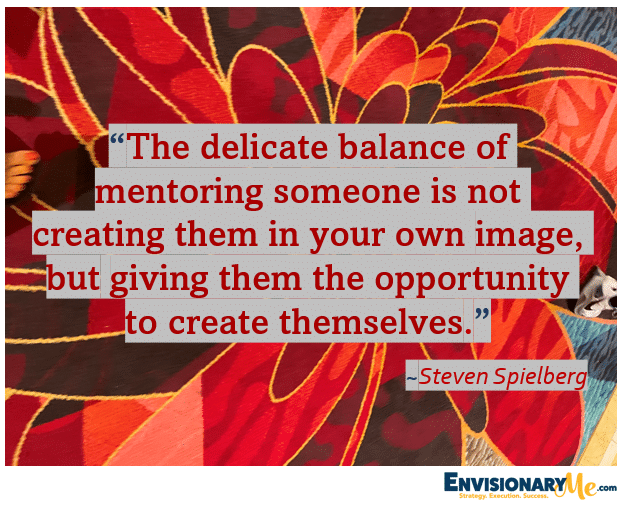Flexible, creative mentorship programs meet the needs of both the mentor and the mentee. Successfully mentoring a fellow entrepreneur one-on-one requires good communication and planning. The program does not need to be traditional, but a great mentor knows objectives and activities must be effective and motivational when developing the next generation of successful entrepreneurs!

Entrepreneurship majors need great mentors who provide advice, share experience, and help expose them to sound business practices before opening their own businesses. In the role of a business mentor, you must consider the following:
- Traits your mentee should demonstrate
- Traits and experience you bring to the relationship
- Your own leadership skills
Use this knowledge to then:
- Get to know your mentee
- Craft a mentorship plan
- Create strategic activities
Becoming self-employed does not come with onboarding or corporate guidance that is typical for new hires. Young entrepreneurs will not have leadership role models on site or mentors from various departments who can be pulled into a meeting room for a quick chat or informational download.
A thoughtful, well-planned mentorship program will make a big difference in how they begin their journey as a business owner after graduation.
Being a great mentor to an entrepreneurship major is not complicated or difficult. Success is a matter of good communication and planning. Mentorship programs should be set up in a way that benefits the mentor-mentee relationship. What’s important is to understand your mentee’s needs, create a plan with SMART goals and make sure you both communicate and remain accountable.
Open your mind. Mentors can help in so many ways. Consider their personality and needs, then let them take the lead, or you take the lead. If they seem nervous, foster independence and self-confidence by letting them know they are doing great and the feelings are natural.
When setting up the mentorship plan, just know what’s right is literally whatever is most motivational to the student and leads to a solid plan with buy in from both of you.
An entrepreneurship major will typically relate well to a strong-minded, and independent personality. Someone who may not be thought of as a traditional mentor may be terrific. See this as a positive. See this as a great opportunity for you. They must learn how you overcame hurdles and the successful moves which made you who you are today.

Immediately after graduation, your mentee must demonstrate:
- Initiative
- Motivation
- Self-confidence
- Dedication
- Sound decision-making capabilities
- An ability to create and follow a business plan
- The desire to remain fiscally responsible
- Be resourceful
Resourceful? Yes! They’ll need to manage finances and possibly secure funding. They need to know when and how to seek advice, create direction, and find support. All of those traits will come into play immediately.
The moment entrepreneurship majors are handed a degree, it begins. No one’s laying out a welcome mat. No one is helping them sign their new hire forms and introducing them to a corporate trainer.
Instead, most entrepreneurship grads are on their own. They must cheerfully figure out where to start and then how to break their business plan down into productive days. Self-motivation is critically important.
This is where you come in!
They’ll value your insights and help creating their initial path. It’s a matter of positive thinking, using those traits and skills, and planning. You introduce reality, and they need to know this information. You’ll help them understand what it takes so they’re thinking, planning – and Ready to GO!
Developing a mentoring relationship with an entrepreneurship major is rewarding!
TRAITS OF A GREAT MENTOR FOR A FELLOW ENTREPRENEUR
- Good listener: A good listener is a sounding board who allows the mentee to dream while helping them focus.
- Knowledgeable: You are knowledgeable! It’s why you are here, right?!
- Flexible: You help draft a plan with determining motivating activities that inspire learning.
- Resourceful: You are willing to commit time but also offer your creative thinking, resources, and your own network to ensure a positive mentorship outcome.
- Values diverse perspectives: You value diversity while also understanding and valuing their perspective without being judgmental.
- Honest: You’re willing to share and provide constructive feedback without crushing their spirit.
- Motivating: You will use your ability to blend positivity with candidness, helping them see the positives while giving them a reason to keep going.
LEADERSHIP ABILITIES YOU BRING TO THE MENTOR-MENTEE RELATIONSHIP
- Strong sense of self-awareness
- Getting out of your comfort zone
- Goal setting
- Taking responsibility
- Embracing change
- Having a growth mindset

GET TO KNOW YOUR MENTEE
- Understand their career goals.
- Find out their “why.”
- Understand what they want out of this mentorship and how you can help.
- Know what makes them tick.
- Understand what they believe they need and areas they want to develop.
- Both of you must commit to the mentorship and agree to follow it through.
- Share your communication styles and schedules to determine how you’ll communicate and when.
As you get to know your mentee, think through your own entrepreneurial experience and the professional relationships you developed; let the process flow from there.
CREATE A MENTORSHIP PLAN FOCUSED ON GROWING A BUSINESS
Your experience and business knowledge will be very helpful in setting up this plan.
- Create a formal plan with objectives and agreements.
- Combine in-person meetings with virtual time, phone calls, and email communications. Keep the process moving forward.
- Setting SMART goals will help ensure accountability.
SMART goals are specific, measurable, achievable, relevant, and time-bound.
- Be creative and flexible when choosing activities.
- Activities may be performed together or just by the mentee but must align with the program goals.
- Include a formal ending, even if you agree to extend your relationship or the process.

SET UP STRATEGIC MENTORSHIP ACTIVITIES
Strengthen your mentee’s business-building skills.
Be creative and flexible, especially if your own schedule is busy and fast-paced. Creativity counts when time is of the essence! A great way for budding entrepreneurs to learn is through observation and seeing success in action. Mentoring activities should be focused on career development but should also be fun, motivational learning experiences for the student of entrepreneurship!
There are no wrongs except missed opportunities. Best practices for mentors and mentees are all about what works and helps them achieve mentorship objectives. There’s no best way.
Strategic activities might include:
Job shadowing: Let your mentee shadow you for a day, a week, or for certain events.
Reverse mentorship activities: Consider your own business needs and what excites them. A real-life business project creates an opportunity to help them grow, develop confidence, and helps you uncover new opportunities too.
For Example: Provide real-world marketing experience.
* Review your marketing plan with them.
* Take their social media advice.
* Allow them to craft a brief video related to a trending topic to help market your product.
* Have them review the results and create a follow-up recommendation.
Build their own brand: Review their social media presence and help them set up a path to personal branding through professionalism or to support their own product or service.
Flash mentoring activities: Have them meet with people in your company or network.
Presentation skills: As an entrepreneur, they’ll be presenting ideas and introducing themselves continually. Give them some practice! Help them distinguish between professional confidence, ego, and BS.
Expand their network: Help them recognize and/or create their own personal board of advisors – each with a specific strength – to help them build each of the leadership skills listed above.
Business building skills: Walk them through a planning session to help them get started. What will they do the first day after graduation? How will they prioritize? How will they fill their days? Introduce them to the most effective ways to network and create customer reach.
What else: books, audio/podcasts, community events, formal and informal networking events, online events. Ask where they go and what they do. Consider what is convenient to those activities or that geographic area. It’s less about convenience and more about opening their eyes to the opportunity that is all around them.
It’s important to take an active role. You don’t have to attend every activity but do actively support through motivation and helping your mentee stay on track.
Becoming a mentor and advisor to an entrepreneurship major is an opportunity to share your own learnings and help your mentee build confidence while crafting their own path. As their mentor, you are here to help them begin their entrepreneurial journey.
It’s easy to dream, but it’s not easy bringing that dream to life. Helping them get started with managed expectations and a plan to follow is important.
Get ready to impart knowledge and learnings from your business experience! Your mentee’s growth and development has them poised for graduation, and that right mentor – YOU – will help them start up their new venture with confidence and a true shot at success.
Creating their own path can be incredibly daunting and overwhelming – far different than accepting a job offer, graduating, and starting new hire training! At this early point in their career, your support and guidance as a mentor means more than they can even know!
Accept this pat on the back – from someone who Does know!

0 Comments